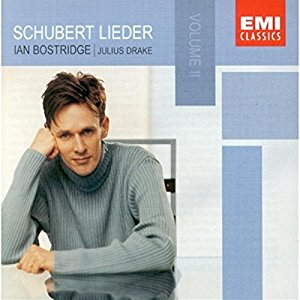Schubert: Lieder Vol 2
Purchase:
<iframe src=”https://open.spotify.com/embed/album/2xhA1Nn9ZmXRZbfCTwebED” width=”100%” height=”380″ frameborder=”0″ allowtransparency=”true”></iframe>
Schubert: Lieder Vol 2
2001 | EMI Classics
Ian Bostridge (tenor)
About
Ian Bostridge’s second Schubert recital for EMI (which features a welcome number of the less familiar songs) is even more impressive than the first–and that’s saying something. Much of the disc finds him in a somber mood, from the hymnlike tone of the first song, “Lied eines Schiffers an die Dioskuren” (“Sailor’s Song to the Dioscuri”), via “Nachtstück” (“Nocturne”) to “Wehmut” (“Melancholy”). But though the tone is frequently valedictory and the tempo often slow, there is never a lack of variety.
That is Bostridge’s achievement as much as Schubert’s–he has designed his program with great sensitivity, and his voice seems to have grown in soulfulness and depth (try “Abendstern”–“The Evening Star”–to hear how much he can wring out of such apparently simple lines) to be even more mellifluous than previously, cherishing each word and finding total accord with pianist Julius Drake. Bostridge delights, too, in the rare happier moments, such as two of the Goethe settings, “Geheimes” (“A Secret”) and “Versunken” (“Rapt Absorption”), which explore the lighter side of love. The recording is beautifully lifelike, and the liner notes are excellent. This is the work of a supreme artist caught at the height of his powers. –Harriet Smith
